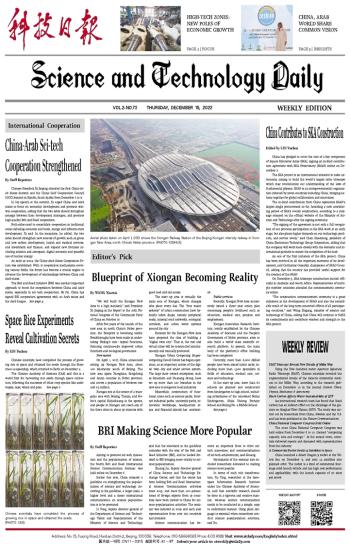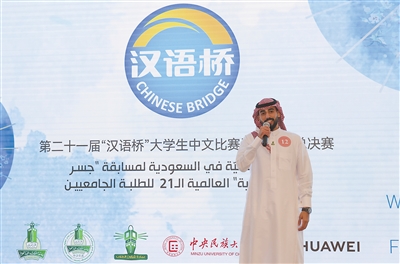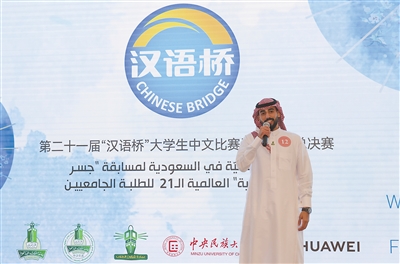
 China, Arab World Share Common Visions
China, Arab World Share Common Visions HIGH-TECH ZONES: NEW POLES OF ECONOMIC GROWTH PAGE 2 | FOCUS
HIGH-TECH ZONES: NEW POLES OF ECONOMIC GROWTH PAGE 2 | FOCUS Blueprint of Xiongan Becoming Reality
Blueprint of Xiongan Becoming Reality China Contributes to SKA Construction
China Contributes to SKA Construction China-Arab Sci-tech Cooperation Strengthened
China-Arab Sci-tech Cooperation Strengthened Space Rice Experiments Reveal Cultivation Secrets
Space Rice Experiments Reveal Cultivation Secrets WEEKLY REVIEW
WEEKLY REVIEW BRI Making Science More Popular
BRI Making Science More Popular 无标题
无标题
 |
| Ahmad Sulaiman, the first place winner, delivers a speech in the "Chinese Bridge" Chinese proficiency competition for university students in Riyadh, Saudi Arabia on July 20, 2022. It was the first time that Saudi Arabia held the competition. (PHOTO: XINHUA) |
 |
China-Arab relations are expected to grow stronger after Chinese President Xi Jinping attended the first China-Arab States Summit and the China-Gulf Cooperation Council Summit in Riyadh, Saudi Arabia, as well as paying a state visit to the country.
This is the largest and highest-level diplomatic event between China and the Arab world, and an epoch-making milestone in the history of China-Arab relations, said China's Foreign Ministry spokesperson Mao Ning at a press conference.
Though geographically miles apart, China and Arab countries have worked steadily to develop strong and solid bilateral relations. In the past few decades in particular, the two sides have conducted pragmatic cooperation in various fields, including the Belt and Road Initiative (BRI), trade and economy, energy, and high technology.
Currently, China has signed BRI cooperation agreements with 20 Arab states and the Arab League. The two sides have also carried out more than 200 large-scale cooperation projects.
China's trade volume with Arab states stood at over 330 billion USD in 2021, a year-on-year increase of 37 percent, according to a report on China-Arab cooperation in the new era by Foreign Ministry of China on December 1.
In the new energy sector, China has expanded cooperation with Arab countries in solar energy, wind energy and hydropower, setting up a China-Arab clean energy training center, the Chinese-Egyptian Renewable Energy Laboratory, and implemented cooperation projects such as the 800 MW Al Kharsaah Solar Power Plant in Qatar and the 186 MW solar power stations at the Benban Solar Energy Park in Egypt.
Most notably, the visit featured prominently in Western media, with Reuters reporting President Xi received a lavish welcome, which stood in stark contrast to the low-key welcome extended in July to U.S. President Joe Biden.
Xi's visit reflects "much deeper relations developed in recent years" between the two countries, Ali Shihabi, a Saudi Arabian analyst, told Al Jazeera.
China has become Saudi Arabia's largest trading partner for the past five years, according to the official Saudi Press Agency (SPA). "As the largest importer of Saudi oil, China is a critically important partner," said Shihabi.
Meanwhile, Saudi Arabia is also the biggest Arab country to receive Chinese investments between 2005 and 2020, accounting for more than 20.3 percent of China's total investment in the Arab world, said SPA.
Beyond that, the two countries have conducted cooperation in space exploration, 5G communication and clean energy.
More importantly, cultural exchanges are also being enhanced. There are many opportunities for cooperation in exhibitions, exploration, cultural events, research and publications, Saudi writer Maha Akeel wrote in her article titled Cultural Diplomacy Can Cement Saudi-Chinese Relations . The article was published in Arab News, the largest English-language daily in Saudi Arabia. She believes these diverse forms of cooperation serve the joint objectives of the two counties' long-term strategic development plans - China's BRI and Saudi Arabia's Vision 2030.
Now, many Saudi universities and schools offer Chinese language classes, while Arabic is taught in 44 Chinese universities.
There is "extraordinary synergy" between BRI and Vision 2030, both in spirit and scope, Pakistan scholar Ishtiaq Ahmad wrote. He thinks a promising future awaits the Arab world as the comprehensive strategic partnership between China and Saudi Arabia moves forward to consolidate the respective gains of BRI and Vision 2030.

 Next
Next



